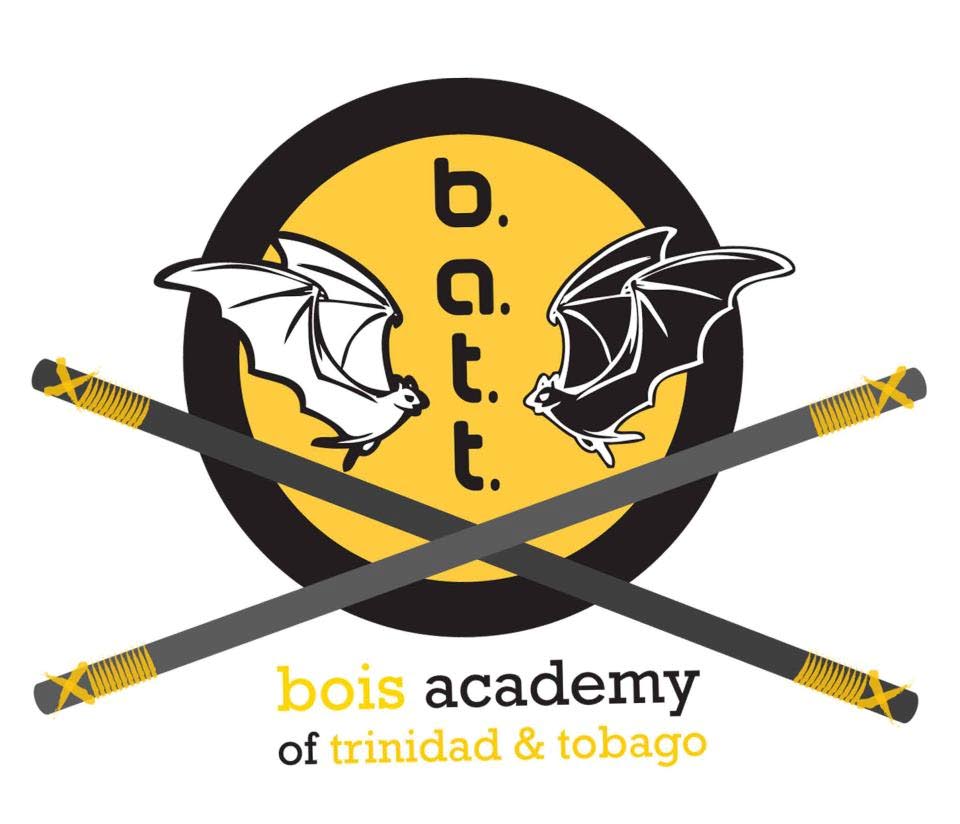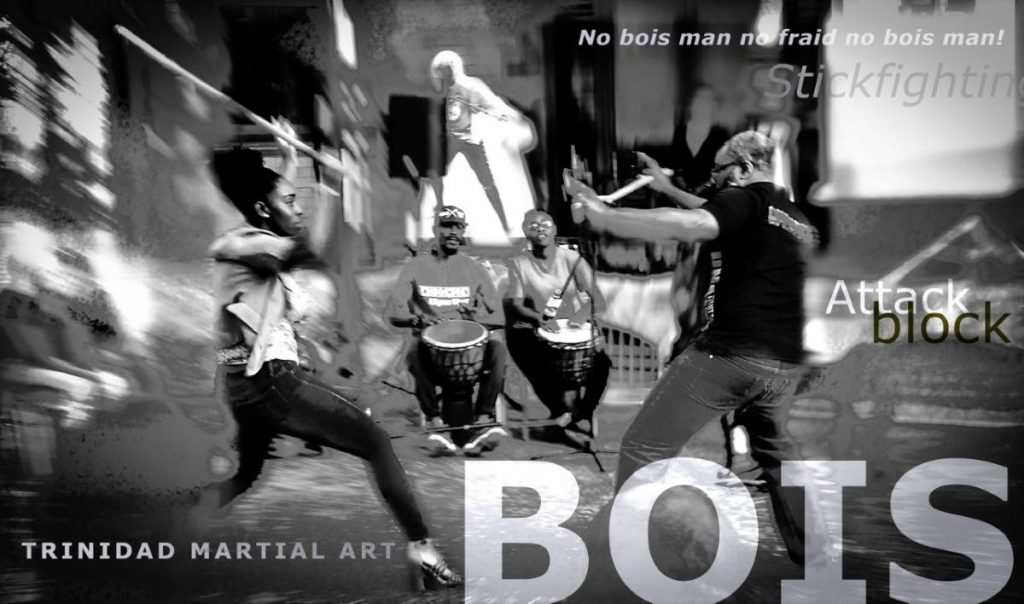Bois for you!

Shereen Ali
AS cars raced around the Savannah at 5 pm fleeing stuffy downtown offices, a peculiar, exciting drumming sound arose on the grounds of Castle Killarney. Peppering the air with upbeat rhythms and cross-beats, it was as if a floating fragment of another reality were visiting this sprawling old Queen's Park mansion of privilege for just a few hours.
For those who’d never heard real Kalinda music before, it was a rare treat: an echoing roots music infinitely more powerful and inspiring than much of Trinidad’s bubbly (and quickly forgotten) Carnival party music.
The occasion was Walk on Dem, a lecture and demonstration on stickfight on March 21, the penultimate event of a month-long multimedia exhibition at Castle Killarney called Carnival at the Castle. The music was from recorded lavways (lavway is French patois for voice) which are call and response chants used in stickfights. The lavways are part of a Kalinda project by The Bois Academy, a stickfighting school run by Keegan Taylor and Rondell Benjamin.
Some folks may admittedly not be too keen on sports involving violence: the intricacies of “buss head” (burst head/split skulls) and the idea of hitting someone else hard with a big stick may not be everyone’s cup of tea. However, not a single skull was split in this upbeat martial sports and arts demonstration. It turned into an interactive, entertaining living history lesson about the value of learning how to defend yourself and attack your enemies while keeping your sense of balance, not to mention your wits, ready for action and response.
Overcoming one’s own fear in the face of a scary situation, and having the courage and skills to meet the situation, even being ready to face death, are all part of the lessons of stickfighting, which, as we learned, is more of a spiritual, inner form of training than the more obvious physical combat we see with our eyes.
The audience heard about the roots of stickfighting from the days of slavery and indentureship as a form of male training and fitness for combat. They learned that stickfighting or “bois” (the French word for wood) is in fact a home-grown martial art, just as Japan has its bushido codes of samurai or Brazil has its capoeira traditions. The challenge of fighting in the gayelle (the circular outdoor fight arena), the motivating fight songs and the warrior psychology of Kalinda/stickfighting built a feeling of confidence, helped channel aggression in a healthy way, and unlocked inner potential amongst practitioners who developed a sense of individual and community empowerment.
Leading the bois talk that evening was Rondel “Benji” Benjamin, founder in 2010 of The Bois Academy which gives lessons in stickfighting to one and all in Barataria. Benjamin predicted that within the next ten years, most stickfighters in Trinidad would be women. And as if to prove his point, most of the volunteer fighters who came out to “play-fight” with him that evening were women.
Chantuelle Mohammed Muwakil, master drummer Peter Noel and female drummer Tanika Bailey provided the live music and song, while some haunting, fiery recordings of traditional, authentic Kalinda fighting chants also filled the castle grounds during the fight demonstrations.
“A gayelle for us is a safe space, where we can confront certain ideas,” Benjamin said, before he taught the audience how to respond properly to a lavway, belting out the chant: “Walk on dem / Trinidadian tiger!”

He explained The Bois Academy tries to do several things, including getting people actively participating in Kalinda as an experience rather than just watching it; and archiving the rich array of Kalinda music. (The word Kalinda refers to both the music and the stickfighting tradition.) “Kalinda is a repository of over four to 500 years of information that has been passed down from generation to generation. It resisted every colonial attempt to stamp it out. Trinidad is the last bastion of active, 100 per cent Kalinda. From New Orleans to Venezuela, Kalinda existed,” Benjamin said, as evening green parrots screeched homewards in the sunset.
Benjamin asked people to talk to their grandparents and great grandparents to hear Kalinda stories, and share the stories with him, to help archive these stories and “sustain ancestral memory.”
“Kalinda was bigger than cricket in the twenties and thirties. It was practised through all the islands. It was the primary participant and spectator sport,” he said. He observed that Trinidad stickfighting drew from both African and Indian fighting traditions.
He sang part of a Kalinda song:
We playing with tide! We playing with tide, Mayaro! (drumming) We playing with tide, Mayaro! (drumming) Coconut on de beach, Rio Claro!
Many cultures, he said, like to hide their philosophy, and he asked the audience what they thought the song lines might mean. One person answered: “The tide is high and low, so maybe we playing like water.” Benjamin seemed to approve and said a Kalinda expert had told him once that Kalinda is not external knowledge, it is internal knowledge that one finds and discovers.
“When you stand up in Mayaro and look out into the ocean, you know what a lotta people saw, 200 years ago? They saw Africa. They saw home. And they (were) like a coconut, they on the sand, the tide of life wash dem up here, so yuh live here,” reflected Benjamin, speaking of people’s resilience. “And what (is) more resilient than a coconut?” he asked. “To be able to take root no matter what rough seas besiege you, to find yourself wherever, and to produce life.”
He said Kalinda is a musical construct in which the tide lies very deep – starting with the drum beat of the heart, the most primal tide or rhythm. He went on to explain that stickfighters approach their martial art seriously, fasting for 40 days before Carnival, and praying, asking for protection and guidance, as the fighters discipline themselves to create in themselves a sacred space to transcend their normal selves.
He talked about the historical retrenchment exercise of Emancipation and how Kalinda was done by freed men to celebrate on August 1, Emancipation Day. Benjamin emphasised that stickfighting predated Carnival; stickfighting was a tradition not connected to masquerade but to the warrior tradition and to the initiation of young people into adulthood.
Benjamin asked or challenged the audience to embrace home-grown traditions like Kalinda to help us grow as individuals and find a sense of freedom and meaning though our own traditions.
More info: Bois Academy: boisacademytt@gmail.com Facebook: https://www.facebook.com/pg/Bois-Academy-of-Trinidad-Tobago
Tedexportofspain talk on stickfight : http://tedxportofspain.com/portfolio/keeg
.


Comments
"Bois for you!"